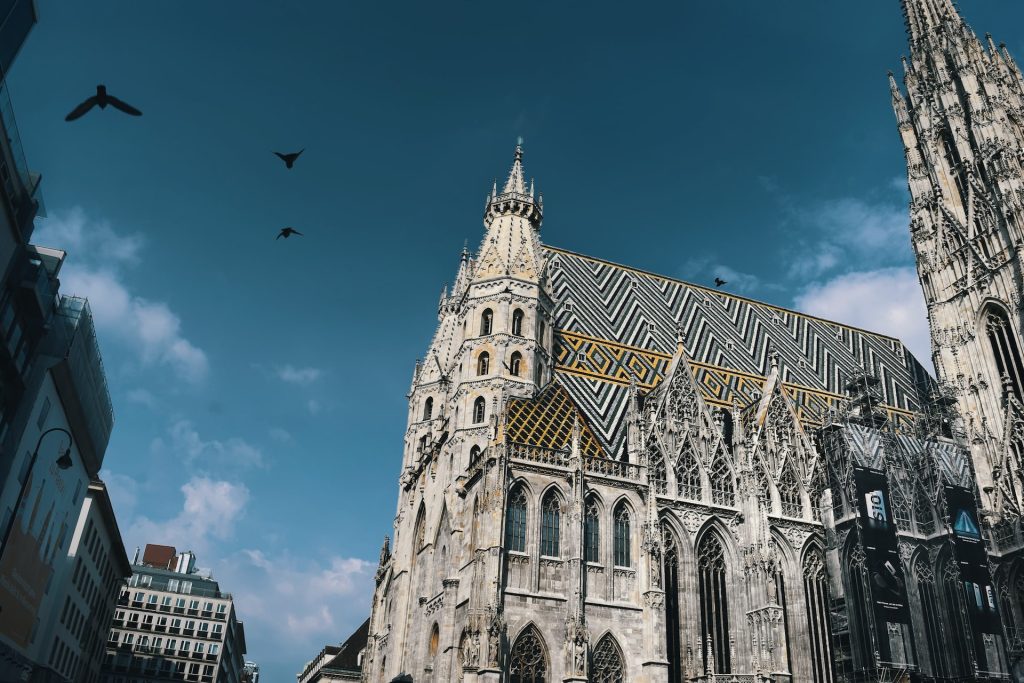My doctoral diary: The 2022 EUPRERA PhD seminar and congress in Vienna
About the author
Miriam Pelusi is studying for a PhD in public relations at Leeds Beckett University. Her doctoral thesis investigates the relationship between dialogue and ethics in public relations, using an autoethnographic approach.

Two weeks ago I was in Vienna for the EUPRERA PhD seminar and congress. The beautiful city of Vienna, with its retro look and elegant style, has a vibrant intellectual history, and it certainly offered an inspiring scene for scholarly discussions.
Now’s probably a good time to reflect on my experience in Vienna. Interpreted retrospectively, the lived experience is more meaningful.
The EUPRERA PhD seminar was a formative experience. My supervisors, Brian Jones and Liz Yeomans, had advised me to take part since the first year of my PhD and have supported me throughout the process. The seminar combined peer support amongst us students with academic coaching delivered by Øyvind Ilhen, Jens Seiffert-Brockmann and Sarah Marschlich. The three facilitators led interactive sessions on the ups and downs of doing a PhD, the PhD student-supervisor relationship, and the development of an academic career. Above all, I will treasure their pieces of advice for my academic development.
We had to review and critique each other’s work. To contribute to knowledge researchers challenge, question, critique. We experienced all this; this was a challenging time for us all, but it is in being challenged that we developed key skills such as argumentation skills. It takes a professional mind, study and preparation to become not just any researcher, but a good researcher.
Before the congress started, we met the EUPRERA Board of Directors. Jesper Falkheimer, Executive Director, asked us what we had in common because we were from different European universities. I replied that although we had different views on PR and followed diverse research approaches, we were all on a big learning curve. Angeles Moreno, Past President, remarked that the learning path never ends for researchers.
The theme of the EUPRERA 23rd Annual Congress was ‘Public Relations in the Risk Society: Dealing with Uncertainty, Insecurity and Crisis’. The expansion and growing sophistication of PR research is evident, particularly during the current times of uncertainty. Increasing insecurity requires researchers to seek out and embrace new challenges for the benefit of knowledge.
PR scholars concurred that in times of uncertainty communication is crucial. The Covid-19 pandemic research lies at the intersections between different strands of communication including health communication, crisis communication, internal communication, media and social media communication, organisational communication, management and leadership communication. This year’s immediate focus was on the vaccination campaigns and people’s emotional and cognitive responses; there was also a lot of misinformation inherent in the public discourse. This provided a good case for evaluating differences between countries, PR requires more than ever intercultural sensitivity and attention to human communication. In fact, the pandemic brought with it issues of vulnerability, authenticity, a sense of belonging, trust and empathetic leadership, and also, a study by Christopher Ruppel and Julia Stranzl found, appreciation in employee communication.
It is looking like a new sensitivity to communication has emerged since 2020.
The human interaction was the added value of the congress, spontaneous conversations that happened while eating Mozart chocolates during a coffee break or in front of a Viennese Schnitzel during the conference dinner. There was a welcoming environment, the atmosphere was like one of a Viennese coffee house in which intellectual conversations flow so naturally.
In amongst panels and sessions, I spoke to sociologists in public relations about the similarities and differences between sociology and anthropology. In an interesting conversation with Ganga S Dhanesh, she explained to me how presenting your work at a congress can then improve your paper because the thinking gets more focused. I also talked to poster presenters and found new insights in visual communication, the trend at the moment is making complex research accessible and digestible to any audience in the format of a poster.
Understanding finer aspects of doing research requires ethnographic techniques such as observation that took me beyond the interaction itself. I used my powers of observation to notice how scholars used particular skills whilst delivering their conference presentations or answering queries. I wanted to learn directly from them all things that cannot be learnt from research handbooks (although reading manuals is of course essential).
In Vienna, I could see at a glance that knowledge is alive, and researchers construct it every day. When individual intellectual efforts turn into a constructive exchange of views, then that information sharing generates new ideas and collaborations.
The ‘Meet the editor’ session was another good opportunity for me as I’m thinking about my first research paper. Zerfass pointed out that ‘Conceptual articles thrive on debate’; in exploring concepts scholars challenge definitions. All editors confirmed that innovation is key: they are looking for a unique insight, they need articles that present an aspect not yet considered.
So, theoretical insights and practical impact is what matters most for being published.
PR research is evolving in relation to the communication profession. I attended ‘The Communication professions’ session and I was pleased to see that efforts are being made to bridge the gap between academia and practice. Rickard Andersoon argued that, in PR, alongside scientific knowledge (episteme) and technical knowledge (techne), we need more situated knowledge which is learnt through experience. Pilot work is becoming more relevant because it helps researchers adapting their studies to real-life contexts, for example Jeanne Leanne and Fiona Vaassen presented insights from a pilot study that assessed business models of communication which is part of a wider project aimed at designing a new Communication Business Model (CBM) approach.
To my gratification, other than many quantitative studies I saw a few qualitative studies that adopt ethnography. The value ethnography brings to PR research includes close observation of human nature through participant observation and interviews. We need more of these studies, I believe, particularly in European scholarship which stems from social theory.
In the session ‘Advancing Theory’, I listened to Timo Lenk, winner of the EUPRERA best paper award, addressing narratives and discourse as an analytical framework for theory development and deeper understandings. This bodes well.
More important was the chance to briefly present my thesis at the congress during the PhD panel. During the seminar we had prepared our elevator pitch and we were ready to answer questions. I took pride in my research project because it was the first autoethnographic study presented at a EUPRERA congress.
One controversial debate in PR research is the dichotomy between positivism and interpretivism in social research. In such discussions, I learnt to hold my ground. I have argued that the contribution of interpretivism in social science is powerful. The diversity of backgrounds, philosophical views and research approaches will expand European studies in PR further and help reach deeper understandings of phenomena which are socially constructed, like dialogue.

PhD students were invited to join the European Network of Emerging Scholars (EUNES), and this has been a major highlight for me. The world of research is fast-paced; the research market is highly competitive because of the increased pressure on publishing due to rankings and reputation. I am already experiencing the challenging and demanding nature of doing research. Having spoken to other PhD students and early career researchers I’m aware that many share this feeling.
On the other hand, there is an increased awareness of the importance of protecting academic wellbeing , and also a consciousness that quantity is not necessarily synonymous of quality. It is therefore important to build a strong research community, and this European research network is a good example of how those involved in research can support each other, and that everyone can contribute to the development of the research community.